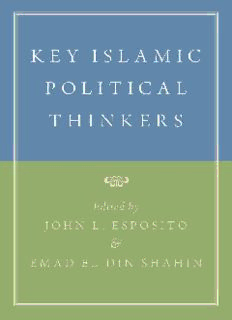
Key Islamic Political Thinkers PDF
Preview Key Islamic Political Thinkers
KEY ISLAMIC POLITICAL THINKERS KEY ISLAMIC POLITICAL THINKERS Edited by John L. Esposito AND Emad El-Din Shahin 1 1 Oxford University Press is a department of the University of Oxford. It furthers the University’s objective of excellence in research, scholarship, and education by publishing worldwide. Oxford is a registered trade mark of Oxford University Press in the UK and in certain other countries. Published in the United States of America by Oxford University Press 198 Madison Avenue, New York, NY 10016, United States of America. © Oxford University Press 2018 The essays in this volume were originally published in The Oxford Handbook of Islam and Politics All rights reserved. No part of this publication may be reproduced, stored in a retrieval system, or transmitted, in any form or by any means, without the prior permission in writing of Oxford University Press, or as expressly permitted by law, by license, or under terms agreed with the appropriate reproduction rights organization. Inquiries concerning reproduction outside the scope of the above should be sent to the Rights Department, Oxford University Press, at the address above. You must not circulate this work in any other form and you must impose this same condition on any acquirer. Library of Congress Cataloging-in-Publication Data Names: Esposito, John L., editor. | Shahin, Emad Eldin, 1957- editor. Title: Key Islamic political thinkers / edited by John L. Esposito and Emad El-Din Shahin. Description: New York, NY : Oxford University Press, 2018. | Includes index. Identifiers: LCCN 2018013406 (print) | LCCN 2018015122 (ebook) | ISBN 9780190900366 (updf) | ISBN 9780190900373 (epub) | ISBN 9780190900359 (pbk.) | ISBN 9780190900342 (hardcover) Subjects: LCSH: Political science-Islamic countries. | Political science-Philosophy. | Islam and politics. Classification: LCC JA84.I78 (ebook) | LCC JA84.I78 K49 2018 (print) | DDC 320.55/70922—dc23 LC record available at https://lccn.loc.gov/2018013406 1 3 5 7 9 8 6 4 2 Paperback printed by WebCom, Inc., Canada Hardback printed by Bridgeport National Bindery, Inc., United States of America CONTENTS Contributors vii Note on Transliteration ix Introduction 3 PART I FOUNDERS OF POLITICAL ISLAM Chapter 1: Hassan al-Banna 17 Ahmad Moussalli Chapter 2: Mawlana Mawdudi 44 Joshua T. White and Niloufer Siddiqui PART II REVOLUTIONARY IDEOLOGUES Chapter 3: Sayyid Qutb 67 Shahrough Akhavi Contents Chapter 4: Ali Shari`ati 85 Shahrough Akhavi Chapter 5: Ayatollah Khomeini 104 Mojtaba Mahdavi PART III THE “INTELLECTUALS” OF POLITICAL ISLAM Chapter 6: Hassan al-Turabi 141 Peter Woodward Chapter 7: Rashid al-Ghannushi 159 Azzam Tamimi Chapter 8: Yusuf al-Qaradawi 178 Bettina Gräf Chapter 9: Mohammad Khatami 203 Mahmoud Sadri and Ahmad Sadri Chapter 10: Abdolkarim Soroush 219 Behrooz Ghamari-Tabrizi Index 245 vi CONTRIBUTORS Shahrough Akhavi is Distinguished Professor Emeritus in the Department of Political Science at the University of South Carolina. John L. Esposito is Professor of Religion and International Affairs and Founding Director of the Prince Alwaleed Bin Talal Center for Muslim-Christian Understanding in the Walsh School of Foreign Service at Georgetown University. Behrooz Ghamari-Tabrizi is Professor of sociology and history at the University of Illinois, Urbana-Champaign. Bettina Gräf is a Researcher of Arabic and Islamic studies at Ludwig-Maximilians- Universität in Munich. Mojtaba Mahdavi is the Edmonton Council of Muslim Communities Chair in Islamic Studies and Associate Professor of political science at the University of Alberta. Ahmad Moussalli is Professor of political studies at American University of Beirut. Ahmad Sadri is Gorter Professor of Islamic World studies and Professor of Sociology at Lake Forest College. Mahmoud Sadri is Professor of sociology at the Federation of North Texas Universities. Emad El-Din Shahin is the Dean of the College of Islamic Studies, Hamad bin Khalifa University, Qatar Foundation, and a Senior Fellow at Georgetown University. Niloufer Siddiqui is a postdoctoral fellow in the Department of Political Science at the Rockefeller College of Public Affairs and Policy, State University of New York at Albany. Contributors Azzam Tamimi is an academic and political activist and the former director of the Institute of Islamic Political Thought. Joshua T. White is Associate Professor of the Practice of South Asia studies and Senior Fellow at the Edwin O. Reischauer Center for East Asia Studies at the Paul H. Nitze School of Advanced International Studies at Johns Hopkins. Peter Woodward is Professor of politics at the University of Reading. viii NOTE ON TRANSLITERATION Due to variance in usage, rather than attempt to impose a style of transliteration across the entire volume, we have allowed each author to transliterate foreign-language terms according to his or her stylistic preference.
Description: